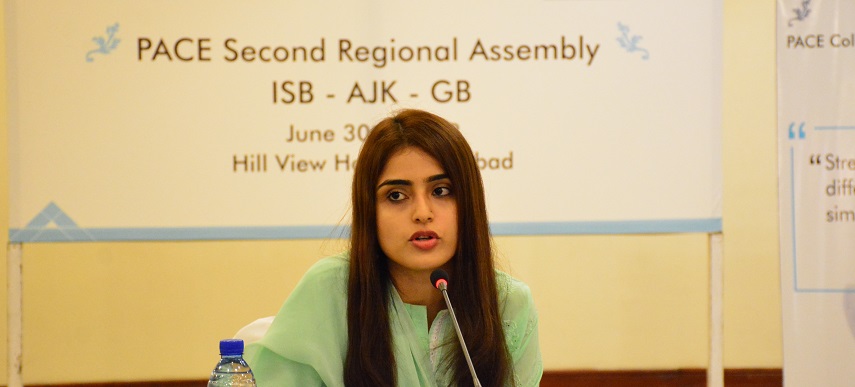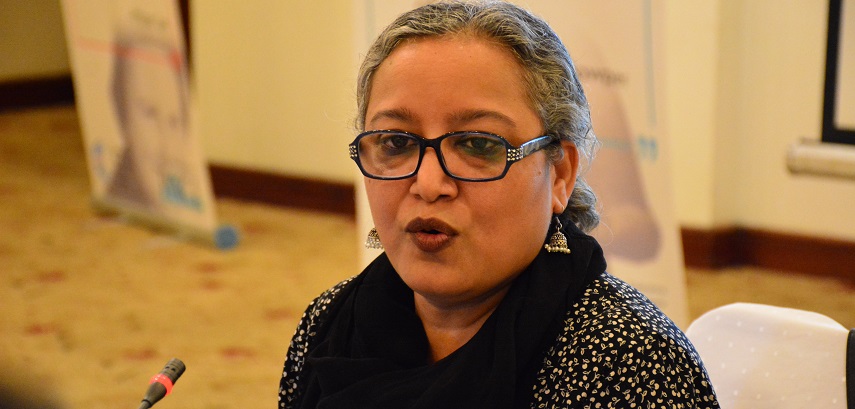EXECUTIVE SUMMARY
The Center for Research and Security Studies (CRSS) conducted the second PACE Islamabad Regional Assembly on June 30, 2018, at Hill View Hotel, Islamabad for young university lecturers and professors who were past participants of the Pakistan Center for Excellence (PACE) Collaborative Workshops. The assembly covered the regions of Islamabad and Azad Jammu and Kashmir.
The objective of the regional gathering was to reinforce the themes that were discussed during the past workshops and to learn from the experiences of speakers and participants in the current climate and volatility of Pakistan. The workshop was conducted under the umbrella of the Pakistan Center of Excellence (PACE), a counter-radicalization and pluralistic values focused project, in collaboration with the Kingdom of the Netherlands. Participants included young university lecturers and professors from two regions of Pakistan (Islamabad and Azad Jammu and Kashmir)
Experts from various fields including, Ms Kishwar Sultana and Ms Humaira Masihuddin discussed a range of new topics with participants. These topics not only reinforced earlier ideas inculcated in the attendees, but also introduced deeper themes for them to explore with their respective students.
Proceedings
The Center for Research and Security Studies (CRSS) conducted the second PACE Islamabad Regional Assembly on June 30th, 2018, at Hill View Hotel for young university lecturers and professors who were past participants of PACE Collaborative Workshops. The regional assembly covered the regions of Islamabad and Azad Jammu and Kashmir.
Participants included young lecturers and professors from:
- Quaid–e-Azam University, Islamabad
- International Islamic University, Islamabad
- Preston University, Islamabad
- The University of Azad Jammu and Kashmir, Muzaffarabad
- Department Of Technical And Vocational Education, Muzaffarabad
- University of Poonch, Rawalakot
- Women University of AJK and Bagh, Bagh
- Federal Urdu University
Opening Ceremony
Ms. Zehra Zaidi, Project Coordinator, welcomed the participants to the regional assembly. She said that PACE workshops gather a diverse group of university teachers from all across Pakistan every month to pull together a wide spectrum of ideas. CRSS, after conducting 30 successful PACE Collaborative Workshops, has now started its second year of conducting regional assemblies.
She shared that the purpose behind this is to re-engage with past participants and reinforce the ideas previously discussed. Furthermore, these assemblies aim to gather feedback on the implementation of practicum activities, so that others can benefit from the lessons learned.
She also highlighted the role of teachers playing an important role in shaping the minds of students and how they can guide them towards becoming responsible, law abiding citizens. It is also important she stated to teach our students the need for a tolerant, just society, regardless of ones caste, sect or religion in order to maintain a multi-cultural progressive society.
Ms. Kishwar Sultana- Respect for Diversity, Rights and Opinion:
Ms. Sultana was the first speaker of the day and started by emphasizing the significance of communication and the importance of openly questioning the myths and taboos that we have grown up with. The experience of every human being is unique and diverse and since inception humans have been surrounded by the cultural and social values that have been a part of our social set up. The varied experiences and other factors one has witnessed are responsible for our cognitive development. Our brain is the organ that basically processes and makes sense of the environment we live in. The impact of outside features leads to making assumptions and if not properly comprehended, result in forming judgments that may not be true at all. The surroundings that are a part of our daily lives, inhibit the ability to critically evaluate and analyze the realities of life.
In order to develop understanding of her topic, she quoted the example of different plants present in a nursery each beautiful and unique in its own way and appreciated for its color, pattern and shape without comparing it to the one next to it whereas humans base their preference on the affiliation of people to different castes, gender and traditional setups. It stands to reason that with the population comprising of 7.5 billion people, spread all over the world it is hard to fathom the whole of human species to be following the same creed and thinking patterns.
She introduced her organization called Insaan (Human) Foundation which solely promotes the rights of human beings irrespective of caste, gender and prevailing attitudes. Being a good human being is the only benchmark the Foundation promotes as the remaining requirements are manmade and not the way God ordained people. All are born equal but the conditioning while growing up gives rise to a number of dogmas such as unequal treatment between genders or people known and respected only for their social position in society. Adhering to being trapped in our own little boxes leads to disparity, frustration and can be termed as a fundamental flaw in our emotional and physical makeup. Diversity is beautiful and should be celebrated in the world, being different and having an opinion should be appreciated not discouraged.
Being a feminist and peace activist, Ms. Sultana strongly advocated peace studies in the academic curriculum of students to give them the edge and understanding to relate things based on their own perception and she concluded her session by stating that the teachers should act as the good will ambassadors by changing their students mindset and by developing out of the box thinking.
Ms. Humaira Masihuddin: Understanding the driving factors behind Religious Intolerance
Ms. Masihuddin’s topic was based on factors that are behind religious intolerance. In today’s world it has reached epidemic proportions and is an issue that needs to be dealt with vigilantly in order to promote peace and tolerance in the world. Religion is being used in a manner only to achieve vested interests of people who are bent on destroying the very fabric of society. Justifying the ills of society and promoting violence in the name of religion has become the norm. Radical and rigid attitude is being exercised in the name of religion and people not following this pattern of thinking are considered outside the norm of religion.
She elaborated the factors that give rise to such phenomenon. Firstly, she stated that it is the duty and responsibility of teachers to ensure that the students are aware of what religion means in terms of freedom, the parameters that define its meaning and the manner in which it should be taught. All children while growing up have an innate sense of justice and can differentiate between right and wrong. The role of the teacher is imperative in guiding their thought processes and understanding of what being religious entails. Developing critical thinking skills is the yardstick that would assist them in analyzing the prevalent issues that are being carried out in the name of religion. Teaching is a profession that entails facilitating them in small measures so as to give them ample time in understanding, digesting and questioning the world around them even in the context of religion and then slowly and gradually building up on their existing knowledge. Islam is a complete religion based on tolerance, rationality and logic. Lack of understanding leads to its distortion.
An example of Sindh’s Counter Terrorism Department was quoted in which they claimed that out of 500 religious militants held in jail, 66 have masters degrees and 60 have bachelor’s



